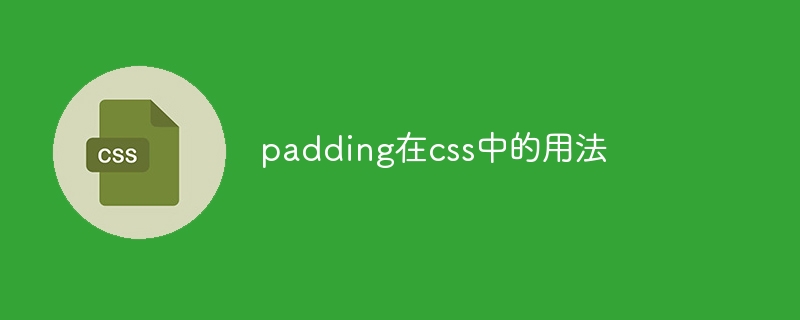How to use padding in css
Padding is used in CSS to set the space around the content of an element. Its uses include creating margins, resizing elements, and aesthetic effects. The syntax is: padding:
;, and the units are px, %, and em. It can be inherited and is part of the box model. CSS3 adds padding-inline-start and padding-inline-end properties for horizontal padding.

Padding usage in CSS
padding is an important style attribute in CSS, used to set The space around the element's content. It can help adjust the position of an element on the page and affect its visual effect.
Uses:
padding is mainly used for the following purposes:
- Create margins: By surrounding elements Adding space puts it at a certain distance from adjacent elements.
- Resize elements: When you increase padding, the total size of the element also increases because it includes the content and padding area.
- Aesthetic effect: Proper use of padding can improve the visual appeal of an element, making it easier to read and understand.
Grammar:
The syntax of padding is as follows:
<code>padding: <top> <right> <bottom> <left>;</code>
Among them:
- ##< ;top>
: Specify the padding space above. : Specify the padding space on the right.: Specify the padding space below.: Specify the padding space on the left.
Unit:
padding can use the following units:- Pixel (px): Specify Absolute pixel value.
- Percent (%): Percentage relative to the width or height of the parent element.
- em: Multiplier relative to the element's font size.
Example:
/* 设置元素顶部和底部各 10 像素的填充 */
.element {
padding: 10px 0;
}
/* 设置元素所有边距为 10% */
.element {
padding: 10%;
}
/* 设置元素左方填充为 2em,其他边距为 1em */
.element {
padding: 1em 2em 1em 1em;
}Note:
- Inheritance: padding Properties are passed to child elements unless the child element has its own padding declaration.
- Box model: padding is a part of the box model that specifies the padding space around the content of an element.
- Composite abbreviation: CSS3 introduces the padding-inline-start
andpadding-inline-endproperties for horizontal padding, Exact usage depends on text orientation.
The above is the detailed content of How to use padding in css. For more information, please follow other related articles on the PHP Chinese website!

Hot AI Tools

Undresser.AI Undress
AI-powered app for creating realistic nude photos

AI Clothes Remover
Online AI tool for removing clothes from photos.

Undress AI Tool
Undress images for free

Clothoff.io
AI clothes remover

Video Face Swap
Swap faces in any video effortlessly with our completely free AI face swap tool!

Hot Article

Hot Tools

Notepad++7.3.1
Easy-to-use and free code editor

SublimeText3 Chinese version
Chinese version, very easy to use

Zend Studio 13.0.1
Powerful PHP integrated development environment

Dreamweaver CS6
Visual web development tools

SublimeText3 Mac version
God-level code editing software (SublimeText3)

Hot Topics
 How to use bootstrap in vue
Apr 07, 2025 pm 11:33 PM
How to use bootstrap in vue
Apr 07, 2025 pm 11:33 PM
Using Bootstrap in Vue.js is divided into five steps: Install Bootstrap. Import Bootstrap in main.js. Use the Bootstrap component directly in the template. Optional: Custom style. Optional: Use plug-ins.
 The Roles of HTML, CSS, and JavaScript: Core Responsibilities
Apr 08, 2025 pm 07:05 PM
The Roles of HTML, CSS, and JavaScript: Core Responsibilities
Apr 08, 2025 pm 07:05 PM
HTML defines the web structure, CSS is responsible for style and layout, and JavaScript gives dynamic interaction. The three perform their duties in web development and jointly build a colorful website.
 Understanding HTML, CSS, and JavaScript: A Beginner's Guide
Apr 12, 2025 am 12:02 AM
Understanding HTML, CSS, and JavaScript: A Beginner's Guide
Apr 12, 2025 am 12:02 AM
WebdevelopmentreliesonHTML,CSS,andJavaScript:1)HTMLstructurescontent,2)CSSstylesit,and3)JavaScriptaddsinteractivity,formingthebasisofmodernwebexperiences.
 How to insert pictures on bootstrap
Apr 07, 2025 pm 03:30 PM
How to insert pictures on bootstrap
Apr 07, 2025 pm 03:30 PM
There are several ways to insert images in Bootstrap: insert images directly, using the HTML img tag. With the Bootstrap image component, you can provide responsive images and more styles. Set the image size, use the img-fluid class to make the image adaptable. Set the border, using the img-bordered class. Set the rounded corners and use the img-rounded class. Set the shadow, use the shadow class. Resize and position the image, using CSS style. Using the background image, use the background-image CSS property.
 How to write split lines on bootstrap
Apr 07, 2025 pm 03:12 PM
How to write split lines on bootstrap
Apr 07, 2025 pm 03:12 PM
There are two ways to create a Bootstrap split line: using the tag, which creates a horizontal split line. Use the CSS border property to create custom style split lines.
 How to set up the framework for bootstrap
Apr 07, 2025 pm 03:27 PM
How to set up the framework for bootstrap
Apr 07, 2025 pm 03:27 PM
To set up the Bootstrap framework, you need to follow these steps: 1. Reference the Bootstrap file via CDN; 2. Download and host the file on your own server; 3. Include the Bootstrap file in HTML; 4. Compile Sass/Less as needed; 5. Import a custom file (optional). Once setup is complete, you can use Bootstrap's grid systems, components, and styles to create responsive websites and applications.
 How to use bootstrap button
Apr 07, 2025 pm 03:09 PM
How to use bootstrap button
Apr 07, 2025 pm 03:09 PM
How to use the Bootstrap button? Introduce Bootstrap CSS to create button elements and add Bootstrap button class to add button text
 How to resize bootstrap
Apr 07, 2025 pm 03:18 PM
How to resize bootstrap
Apr 07, 2025 pm 03:18 PM
To adjust the size of elements in Bootstrap, you can use the dimension class, which includes: adjusting width: .col-, .w-, .mw-adjust height: .h-, .min-h-, .max-h-






